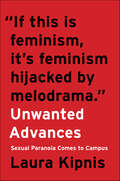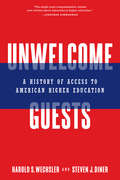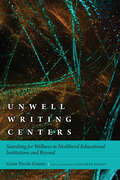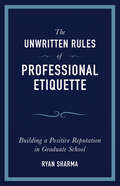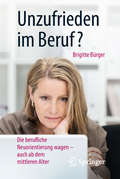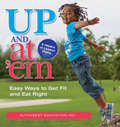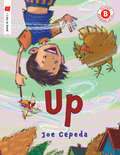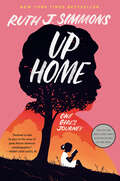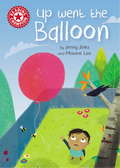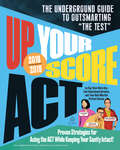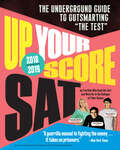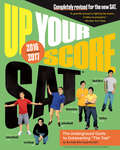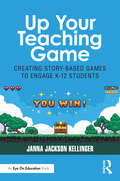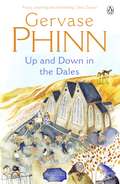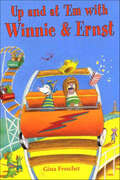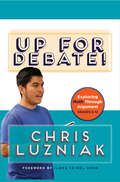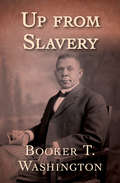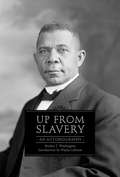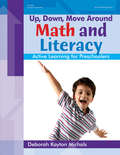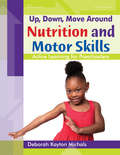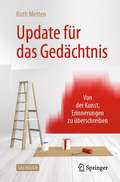- Table View
- List View
Unwanted Advances: Sexual Paranoia Comes to Campus
by Laura KipnisA Wall Street Journal Best Book of 2017 From a highly regarded feminist cultural critic and professor comes a polemic arguing that the stifling sense of sexual danger sweeping American campuses doesn’t empower women, it impedes the fight for gender equality.Feminism is broken, argues Laura Kipnis, if anyone thinks the sexual hysteria overtaking American campuses is a sign of gender progress. A committed feminist, Kipnis was surprised to find herself the object of a protest march by student activists at her university for writing an essay about sexual paranoia on campus. Next she was brought up on Title IX complaints for creating a "hostile environment." Defying confidentiality strictures, she wrote a whistleblowing essay about the ensuing seventy-two-day investigation, which propelled her to the center of national debates over free speech, "safe spaces," and the vast federal overreach of Title IX.In the process she uncovered an astonishing netherworld of accused professors and students, campus witch hunts, rigged investigations, and Title IX officers run amuck. Drawing on interviews and internal documents, Unwanted Advances demonstrates the chilling effect of this new sexual McCarthyism on intellectual freedom. Without minimizing the seriousness of campus assault, Kipnis argues for more honesty about the sexual realities and ambivalences hidden behind the notion of "rape culture." Instead, regulation is replacing education, and women’s hard-won right to be treated as consenting adults is being repealed by well-meaning bureaucrats.Unwanted Advances is a risk-taking, often darkly funny interrogation of feminist paternalism, the covert sexual conservatism of hook-up culture, and the institutionalized backlash of holding men alone responsible for mutually drunken sex. It’s not just compulsively readable, it will change the national conversation.
Unwelcome Guests: A History of Access to American Higher Education
by Steven J. Diner Harold S. WechslerA comprehensive history of the barriers faced by students from marginalized racial, ethnic, and religious groups to gain access to predominantly white colleges and universities—and how these students responded to these barriers.Affirmative action in college admission is one of the most contested initiatives in contemporary federal policy, from its beginnings in the 1960s through the 2014 lawsuit alleging that Harvard discriminates against Asian American applicants. Supporters point out that using race and ethnicity as a criterion for admission helps remediate some of the effects of racist practices on minorities, including restrictions on college admissions. Opponents insist that the practice violates civil rights laws that prohibit racial discrimination and that it reenacts the historic racial bias of colleges. In Unwelcome Guests, Harold S. Wechsler and Steven J. Diner argue that discrimination in college admissions has a long and troubling history in the United States. Institutions of higher learning have vigorously sought to shape their mission and the experiences of their undergraduate students by paying careful attention to race and religion in admissions decisions. Post–World War I institutions devised exclusionary mechanisms that disadvantaged African Americans and other minority students for much of the century. Wechsler and Diner explore how American colleges and universities sought to restrict enrollment of students they considered undesirable. How, they ask, did these practices change over time? And how did underrepresented students cope with this discrimination—and with the indifference, bare tolerance, or outright hostility of some of their professors and peers? Tracing the efforts of people from underrepresented racial, ethnic, and religious groups to attend mainstream colleges, Wechsler and Diner also look at how these students fared after graduation, paying particular attention to Black women and men. Unwelcome Guests illuminates a critically important aspect of the history of American colleges and universities but also addresses policy debates about affirmative action and racial/ethnic diversity in colleges today. This profound history of the limits on college access over decades of discrimination will help readers recognize and understand the central role of race in the history of American higher education.
Unwell Writing Centers: Searching for Wellness in Neoliberal Educational Institutions and Beyond
by Genie Nicole GiaimoUnwell Writing Centers focuses on the inroads the wellness industry has made into higher education. Following graduate and undergraduate writing tutors during a particularly stressful period (2016–2019), Genie Nicole Giaimo examines how top-down and bottom-up wellness interventions are received and taken up by workers. Engaging sociocultural research on how workers react to and experience workplace conflict, Giaimo demonstrates the kinds of interventions welcomed by workers as well as those that fall flat, including the “easy” fixes to workplace issues that institutions provide in lieu of meaningful and community-based support. The book is broken into sections based on journeying: searching for wellness, finding wellness, and imagining a “well” future that includes a sustainable model of writing center work. Each chapter begins with a personal narrative about wellness issues in writing centers, including the author’s experiences in and responses to local emergencies. She shares findings from a longitudinal assessment study on non-institutional interventions in writing centers and provides resources for administrators to create more ethical "well" writing centers. The book also includes an appendix of training documents, emergency planning documents, and several wellness-specific interventions developed from anti-racist, anti-neoliberal, and organizational theories. Establishing the need for a field-specific response to the austerity-minded eruption of wellness-focused interventions in higher education, Unwell Writing Centers is a critical text for graduate students and new directors that can easily be applied in workplaces in and outside of higher education.
Unwritten Rules of Professional Etiquette: Building a Positive Reputation in Graduate School
by Ryan SharmaDid you know that no one cares about your grades in graduate school because everyone gets As? Did you know that all students are doing extra activities to pad their CVs and resumes? Do you wonder how you are supposed to stand out among your peers and get access to special projects, training opportunities, or internship placements? Do you know the common faculty annoyances that may spoil your chances at these opportunities? <P> A truly professional demeanor will give you access to a competitive edge, yet there are many unwritten expectations that-if you are not aware of them-can jeopardize your reputation. The Unwritten Rules of Professional Etiquette gives you an honest account of the ways faculty silently judge students without pulling any punches. With this straightforward advice you can sidestep the hidden graduate school pitfalls and emerge at the top of your class. Covering topics such as excelling in interviews, responding to constructive feedback, and dealing with difficult faculty, this compendium is an essential resource for navigating the complex world of academic relationships. While this is an indispensable handbook for graduate students, undergrads practicing this advice will be truly outstanding.
Unzufrieden im Beruf?: Die berufliche Neuorientierung wagen – auch ab dem mittleren Alter
by Brigitte Bürger Harald SchröderDieser Ratgeber zeigt allen, die ab dem mittleren Alter nach mehr Zufriedenheit im Beruf suchen oder sich beruflich neu orientieren wollen, wie sie dies erreichen, die dafür nötige motivierende Kraft entfalten und auftauchende Hindernisse überwinden können. Brigitte Bürger, erfahrene Beraterin auf diesem Gebiet, bietet dafür hilfreiche "Leitplanken" zur Orientierung und begleitet Menschen mit beruflichem Änderungswunsch Schritt für Schritt durch den oft unübersichtlichen Prozess des Wandels – angereichert mit vielen pointierten Tipps und praktischen Übungen zum Ausprobieren: So gewinnen Sie Klarheit über Ihre nächsten Ziele. So treffen Sie stimmige Entscheidungen. So sammeln Sie Kraft für den vor Ihnen liegenden Weg. So gehen Sie mit Ambivalenz, Antreibern und Rückschlägen um.
Up & At 'Em: Easy Ways to Get Fit and Eat Right
by Alphabest EducationUp and at 'Em! is designed to provide a fun, easy way to get students moving, increase their energy, and improve their coordination and gross motor skills as they learn to work cooperatively. The flexible curriculum integrates physical activity and nutrition into any after school program.
Up (I Like to Read)
by Joe CepedaLet the wind carry you away in this Level B reader, perfect for kindergarteners! Look! Two brothers are asleep in their bed when a magical breeze blows through their window, carrying a pinwheel. When the younger boy brings it to the window, the pinwheel carries him away! Written with only twelve simple words, this picture book is geared toward the newest readers, featuring energetic artwork that helps support understanding of the story. I See is a companion book to Joe Cepeda's other I Like to Read books, Up (a Guided Reading Level B book) and I Dig (Guided Reading Level C), featuring the same curious, excited brothers exploring the world around them and celebrating the diversity of everyday life. The award-winning I Like to Read® series focuses on guided reading levels A through G, based upon Fountas and Pinnell standards. Acclaimed author-illustrators--including winners of Caldecott, Theodor Seuss Geisel, and Coretta Scott King honors—create original, high quality illustrations that support comprehension of simple text and are fun for kids to read with parents, teachers, or on their own! Level B readers feature short sentences with high-frequency words, for kindergarten readers who've mastered Level A and are ready to build more fluency. The illustrations provide clues to word meanings.
Up From Slavery: An Autobiography
by Booker T. WashingtonHailed one of best American autobiographies ever written, Booker T. Washington recounts his life.
Up Home: One Girl's Journey
by Ruth J. SimmonsAn &“extraordinary&” (The New York Times Book Review Editors&’ Choice) memoir from the daughter of sharecroppers in East Texas who became the first Black president of an Ivy League university—an uplifting story of girlhood and the power of family, community, and the classroom to transform one young person&’s life&“A riveting work of literature, destined to take its place in the canon of great African American autobiographies.&”—Henry Louis Gates, Jr., Harvard UniversityI was born at a crossroads: a crossroads in history, a crossroads in culture, and a geographical crossroad in North Houston County in East Texas.Born in 1945, Ruth J. Simmons grew up the twelfth child of sharecroppers. Her first home had no running water, no electricity, no books to read. Yet despite this—or, in her words, because of it—Simmons would become one of America&’s preeminent educators. The former president of Smith College, Brown University, and Prairie View A&M, Texas&’s oldest HBCU, Simmons has inspired generations of students as she herself made history.In Up Home, Simmons takes us back to Grapeland to show how the people who love us when we are young shape who we become. We meet her caring, tireless mother who managed to feed her large family with an often empty pantry; her father, who refused to let racial and economic injustice crush his youngest daughter&’s dreams; the doting brothers and sisters; and the attentive teachers who welcomed Ruth into the classroom, guiding her to a future she could hardly imagine as a child.From the farmland of East Texas to Houston&’s Fifth Ward to New Orleans at the dawn of the civil rights movement, Simmons depicts an era long gone but whose legacies of inequality we still live with today. Written in clear and timeless prose, Up Home is both an origin story set in the segregated South and the uplifting chronicle of a girl whose intellect, grace, and curiosity guide her as she creates a place for herself in the world.
Up Went the Balloon: Independent Reading Red 2 (Reading Champion #379)
by Jenny JinksThis story is part of Reading Champion, a series carefully linked to book bands to encourage independent reading skills, developed with Dr Sue Bodman and Glen Franklin of UCL Institute of Education (IOE)Dev's balloon is off on a grand adventure! Where will the balloon end up? With a bird? Up in the clouds? Read to find out!Reading Champion offers independent reading books for children to practise and reinforce their developing reading skills.Fantastic, original stories are accompanied by engaging artwork and a reading activity. Each book has been carefully graded so that it can be matched to a child's reading ability, encouraging reading for pleasure.
Up Your Score: The Underground Guide to Outsmarting "The Test" (Up Your Score)
by Chris Arp Jon Fish Zack Swafford Ava ChenFully updated to reflect the most current version of the ACT, Up Your Score: ACT remains the test prep and survival guide that kids will actually want to use. Written by Chris Arp, a Princeton graduate and top ACT tutor—with the help of four students who aced the test (and went on to the colleges of their choice)—it’s a true insider’s guide, filled with effective strategies and tips, delivered with the attitude, smarts, and wit that make Up Your Score the bestselling alternative test-prep series in print. ▪ Crush the reading section by developing the Five Habits of Lean Forward Reading. ▪ Master the math section through techniques like “plugging in,” an amazing trick that simplifies all algebra word problems. ▪ Annihilate the English section by absorbing six key punctuation and nine essential grammar rules. ▪ Sail through the science section by understanding that it actually tests reasoning. ▪ Plus, the latest information on ACT scoring and the essay test, revised in 2015 to be more open-ended and analytical.
Up Your Score: The Underground Guide to Outsmarting "The Test" (Up Your Score)
by Larry Berger Michael Colton Manek Mistry Paul RossiThoroughly revised for the revamped SAT, Up Your Score: SAT is the only test-prep guide written for students by students—all of whom achieved perfect or near-perfect scores and went on to the colleges of their choice. A complement and reality check to the mainstream SAT study guides, it’s the book that kids recommend to one another, because it’s as entertaining as it is effective, showing students how to: • Think like the SAT • Ramp up their “mental math” powers • Remember the 12 most important grammar rules • Hone speed and timing • Understand key vocabulary words in context • Be a better guesser (and why it’s always better to guess) • Vanquish anxiety and improve concentration • Best fill in the answer circles, saving nearly six minutes • Unwind with SAT Yoga
Up Your Score: The Underground Guide, 2016-2017 Edition (Up Your Score Ser.)
by Larry Berger Michael Colton Manek Mistry Paul Rossi Zachary Mandell Joshua MandellThoroughly overhauled for the new SAT, Up Your Score is the only test-prep guide written by students—all of whom achieved perfect or near-perfect scores and went on to the colleges of their choice. A complement and reality check to the mainstream SAT study guides, it’s the book that kids recommend to each other, because it’s as entertaining as it is effective, showing students how to: • Think like the SAT • Master insider math tricks • Remember the 13 most important grammar rules • Hone their speed and timing • Be a better guesser (and why it’s always better to guess) • Vanquish anxiety and improve concentration • Best fill in the answer circles, saving nearly six minutes • Unwind with SAT Yoga Packed with up-to-date information and smart strategies for the redesigned SAT, this new edition of Up Your Score is written with a sharp sense of humor in the irreverent voice of a peer, so it engages kids, rather than puts them to sleep. And, to really keep that energy up, it includes a recipe for Sweet & Tasty 800 Bars.
Up Your Teaching Game: Creating Story-Based Games to Engage K-12 Students
by Janna Jackson KellingerUp Your Teaching Game offers K-12 teachers an intuitive and refreshingly fun pathway for creating immersive, story-based games that encourage students to experience the curriculum through play. Regardless of their technical abilities, design acumen, grade level, or domain, today’s teachers have fresh opportunities to create and implement their own content-based games based on the same techniques that video game designers use to create commercial video games. In five actionable steps, this book prepares educators to design curricular games that teach instead of test, that are derived from content rather than divergent from it, and that motivate students to take ownership over their learning. Programs that most teachers are familiar with, such as PowerPoint and Google Slides, and technologies that may be new to them, such as Twine and Scratch, are addressed alongside the use of their own classrooms and schools as game spaces. Novice and veteran teachers alike, as well as curriculum designers and school technologists, will find a wealth of strategies and lessons learned, tips for avoiding pitfalls and time constraints, examples of quests and storyline advancement, and much more.
Up and Down in the Dales
by Gervase PhinnEscape to the country with Gervase Phinn's heartwarming tales of life as a school inspector in Yorkshire'Gervase Phinn's memoirs have made him a hero in school staff-rooms' Daily Telegraph______What's your name? I asked the child.'Tequila,' she replied. I'm named after a drink.''Tequila Sunrise,' I murmured.'No,' pouted the child. 'Tequila Braithwaite.'Now in his fourth year as an Inspector for English in the Yorkshire Dales, Gervase Phinn still relishes visiting the schools - whether an inner-city comprehensive fraught with difficulties or a small Dales Primary school where the main danger is one of closure. With endless good humour, he copes with the little surprises that occur round every corner.Some things never change: Mrs Savage roars, Connie rants, and Gervase's colleague in the office play verbal ping-pong. But all this can be put behind him each day when he returns home to his lovely wife, Christine, who is expecting their first baby.Up and Down in the Dales is charming montage of Gervase Phinn's experiences will keep you amused and will win a place in your heart.Gervase Phinn has an extraordinary talent to entertain, and the latest instalment to the Dale Series is heart-warming, wry and will make you laugh out loud.
Up and at 'Em with Winnie & Ernst
by Gina FreschetWinnie the possum and Ernst the otter are back with four new antic tales. In the first, an excursion to Backwater Beach is complicated by the contents of a piggy bank. Then Winnie gets a telescope and must ad-lib, as the viewing for her friends is disrupted by cloud cover. When Winnie and Ernst baby-sit for Mrs. H. Penny, they aren't prepared for her eggs to hatch. And finally, what better diversion for a February than to organize a poetry contest - but who knew what chaos such an event could cause?Children ready for a step up from early Beginning Readers will find plenty more to enjoy in these new stories.
Up for Debate!: Exploring Math Through Argument
by Chris LuzniakIn Up for Debate!: Exploring Math Through Argument, high school math teacher and debate coach Chris Luzniak shares stories, examples, and step-by-step routines that will help you build a classroom culture where students do the talking, explain their thinking, and critique each other's reasoning, all in the context of the math content you're expected to teach. Inside, you'll find: Inspirational stories of students debating math in real classroomsConcrete structures and routines that will get your students talking, listening, and debatingSpecific techniques you can use to transform existing math problems into debatable ones You'll begin with short speaking and listening routines that take just a few minutes to introduce. When you and your students are ready, you can layer on additional debate routines, until your class is engaged in full-class debates using mathematical reasoning. With this easy-to-read guide, you don't need to wait any longer. You will be able to start debating in your classroom, tomorrow.
Up for Debate!: Exploring Math Through Argument
by Chris LuzniakIn Up for Debate!: Exploring Math Through Argument, high school math teacher and debate coach Chris Luzniak shares stories, examples, and step-by-step routines that will help you build a classroom culture where students do the talking, explain their thinking, and critique each other's reasoning, all in the context of the math content you're expected to teach. Inside, you'll find: Inspirational stories of students debating math in real classrooms Concrete structures and routines that will get your students talking, listening, and debating Specific techniques you can use to transform existing math problems into debatable ones You'll begin with short speaking and listening routines that take just a few minutes to introduce. When you and your students are ready, you can layer on additional debate routines, until your class is engaged in full-class debates using mathematical reasoning. With this easy-to-read guide, you don't need to wait any longer. You will be able to start debating in your classroom, tomorrow.
Up from Slavery
by Booker T. WashingtonBooker T. Washington’s classic memoir of enslavement, emancipation, and community advancement in the Reconstruction Era. Born into slavery on a tobacco farm in nineteenth-century Virginia, Booker T. Washington became one of the most powerful intellectuals of the Reconstruction Era. As president of the Tuskegee Institute in Alabama, he advocated for the advancement of African Americans through education and entrepreneurship. In Up from Slavery, Washington speaks frankly and honestly about his enslavement and emancipation, struggle to receive an education, and life’s work as an educator. In great detail, Washington describes establishing the Tuskegee Institute, from teaching its first classes in a hen house to building a prominent institution through community organization and a national fundraising campaign. He also addresses major issues of the era, such as the Jim Crow laws, Ku Klux Klan, and “false foundation” of Reconstruction policy. Up From Slavery is based on biographical articles written for the Christian newspaper Outlook and includes the full text of Washington’s revolutionary Atlanta Exposition address. First published in 1901, this powerful autobiography remains a landmark of African American literature as well as an important firsthand account of post–Civil War American history. This ebook has been professionally proofread to ensure accuracy and readability on all devices.
Up from Slavery: An Autobiography
by Booker T. Washington Wayne LaPierre<P> In 1856, Washington was born into a family of slaves in Virginia. From there it seemed that his fate had been sealed--to live out his life as a worker in Virginia. But, this was not the case for Washington, whose impoverished childhood and undying desire for education fueled him into a dedicated obsession with the Hampton Normal and Agricultural Institute until he found himself enrolled at the school itself. As an educated man, Booker T. Washington rose to power with his views on civil rights. Washington’s belief in education as well as trade skills for African Americans brought followers, and opposition, from all around. <P> In Up from Slavery, all of Washington’s trials and tribulations are laid out on the page, with nothing left unsaid. Booker T. Washington wrote Up from Slavery over the course of many years in post-Civil War America. It not only contains articles originally published in Outlook magazine, but autobiographical anecdotes as well, which were written throughout Washington’s travels in the south.
Up, Down, Move Around -- Math and Literacy: Active Learning for Preschoolers
by Deborah Kayton MichalsMovement-inspiring activities reinforce key literacy and math concepts!Young children learn best when they connect physical activity with learning! Up, Down, Move Around is packed with fun, simple math and literacy activities that will have your children jumping, shaking, rolling, dancing, and clapping as they learn!From the Syllable Freeze Dance to a Math Orchestra, children ages 3 to 6 will actively explore letters and numbers as they develop number sense, practice counting and rhyming, and learn about letter shapes and story structure.
Up, Down, Move Around -- Nutrition and Motor Skills: Active Learning for Preschoolers
by Deborah Kayton MichalsMovement-inspiring activities reinforce good nutrition, health and motor skills! Young children learn best when they connect physical activity with learning! Up, Down, Move Around is packed with fun, simple activities that will have your children jumping, shaking, rolling, dancing, and clapping as they learn!From the Healthy Food Obstacle Course to the Bendy Bodies Stretch, children ages 3 to 6 will get moving as they learn and support an awareness of nutrition and health concepts as well as fine and gross motor-skill development.
Upbhokra Arthashastra Six Semester TYBA New NEP Syllabus - RTMNU: उपभोक्ता अर्थशास्त्र सहावे सत्र टी.वाय.बी.ए. नवीन एन.इ.पी. अभ्यासक्रम - राष्ट्रसंत तुकडोजी महाराज नागपूर विद्यापीठ
by Dr Ashish Tembekar‘उपभोक्ता अर्थशास्त्र’ हे पुस्तक बी.ए. सहाव्या सेमिस्टरसाठी राष्ट्रसंत तुकडोजी महाराज नागपूर विद्यापीठाच्या अभ्यासक्रमानुसार लिहिलेले असून, याचे लेखक डॉ. आशिष टेंभेकर आहेत. या पुस्तकात उपभोक्त्यांच्या गरजा, खरेदी वर्तन, निर्णयप्रक्रिया आणि बाजारातील त्यांच्या भूमिकेचा सखोल अभ्यास करण्यात आला आहे. पुस्तकात एकूण चार युनिट्स आहेत – उपभोक्ता अर्थशास्त्राची तत्त्वे, ग्राहक आणि कल्याण, ग्राहक संरक्षण व नियामक प्राधिकरणांची भूमिका. ग्राहकांचे वर्तन कसे घडते, कोणकोणते सामाजिक, वैयक्तिक व मानसशास्त्रीय घटक यावर परिणाम करतात, याचे विश्लेषण देण्यात आले आहे. ग्राहक संरक्षण कायदा, ग्राहक हक्क, तसेच विविध प्रकरणांतील न्यायनिवाड्याचे विश्लेषण केलेले आहे. याशिवाय उत्पादन जाहिरात, उत्पादन निवड, ग्राहक जागरूकता व कल्याणावरही भर दिला आहे. हे पुस्तक आधुनिक बाजारपेठेतील ग्राहकांच्या भूमिका आणि त्यांचे अधिकार समजून घेण्यासाठी उपयुक्त आहे. पुस्तक विद्यार्थ्यांना ग्राहक म्हणून सजग बनवते आणि बदलत्या आर्थिक, सामाजिक संरचनेत त्यांची जागरूकता वाढवण्याचे कार्य करते.
Upbhokta Arthashastra Fifth Semester TYBA New NEP Syllabus - SPPU: उपभोक्ता अर्थशास्त्र पाचवे सत्र टी.वाय.बी.ए. नवीन एन.इ.पी. अभ्यासक्रम - सावित्रीबाई फुले पुणे यूनिवर्सिटी
by B. K. Bakshi'उपभोक्ता अर्थशास्त्र' हे बी. के. बख्शी यांनी लिहिलेले आणि निराली प्रकाशनाने प्रकाशित केलेले पुस्तक आहे, जे सावित्रीबाई फुले पुणे विद्यापीठाच्या बी.ए. पाचव्या सेमिस्टरसाठी (CBCS पॅटर्न) तयार केले आहे. हा ग्रंथ चार युनिटमध्ये विभागलेला आहे. पहिल्या युनिटमध्ये 'उपभोक्ता अर्थशास्त्राची तत्त्वे' स्पष्ट केली असून, यात सूक्ष्म अर्थशास्त्रातील ग्राहकाची भूमिका , खरेदी वर्तन , जाहिरातीची भूमिका , ग्राहकांचे सार्वभौमत्व आणि ग्राहक जागरूकता या मूलभूत संकल्पनांचा समावेश आहे. दुसरे युनिट 'ग्राहक आणि कल्याण' यावर केंद्रित असून, ते दिखावटी खर्च (Conspicuous Consumption) , ई-कॉमर्सचा प्रभाव , आर्थिक व्यवस्थापन , जाहिरातींमुळे होणारी फसवणूक , निकृष्ट उत्पादने आणि भारतातील ग्राहक चळवळीचा आढावा घेते. तिसरे युनिट 'ग्राहक संरक्षणा'साठी समर्पित असून, यात ग्राहकांचे हक्क , ग्राहक संरक्षण कायदे (१९८६ व २०१९) , आणि ISI, AGMARK व ISO यांसारख्या मानकीकरण संस्थांची भूमिका तपासली आहे. चौथे युनिट विविध 'नियामक प्राधिकरणांच्या भूमिकेवर' प्रकाश टाकते, ज्यात RBI (बँकिंग) , IRDA (विमा) , TRAI (दूरसंचार) , FSSAI (अन्न सुरक्षा) व RERA (रियल इस्टेट) या संस्थांच्या कार्यांचा आणि संबंधित सर्वोच्च न्यायालयाच्या प्रकरणांचा समावेश आहे.
Update für das Gedächtnis: Von der Kunst, Erinnerungen zu überschreiben
by Ruth MettenDieses Sachbuch möchte Ihnen eine neue Sicht auf Ihr Gedächtnis eröffnen. Viele wird es wahrscheinlich überraschen: Das Gedächtnis ist keineswegs in Stein gemeißelt, sondern formbar. Erinnerungsspuren sind zu verändern – und zwar nicht nur, indem wir vergessen oder gar dement werden. Unter bestimmten Bedingungen lassen sich Gedächtnisinhalte tatsächlich überschreiben. Dafür sprechen inzwischen zahlreiche Forschungsergebnisse. Die Möglichkeit eines solchen Gedächtnis-Updates kann sogar therapeutisch genutzt werden – mit verblüffenden Effekten. Geschrieben für … alle, die mehr darüber wissen wollen, wie ihr Gedächtnis funktioniert. Über die Autorin: Dr. med. Ruth Metten arbeitet als niedergelassene Ärztin für Psychiatrie und Psychotherapeutin in ihrer Praxis schwerpunktmäßig mit Psychodrama, Hypnose und einer Kombination aus beidem – dem Hypnodrama – und hält zum Thema dieses Buches gut verständliche und nützliche Vorträge und Seminare.
